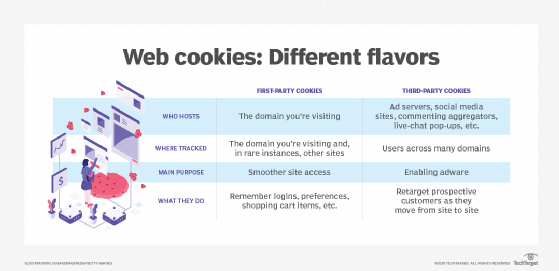
Getty Images
Third-party cookies remain as Google advertising in DOJ's sights
If Google gets sued by U.S. antitrust authorities on the grounds its advertising network is a monopoly, marketers need to plan for how it may affect their operations.
Google is likely to be sued by the U.S. Department of Justice in September on the grounds that its advertising network is a monopoly. What that means for marketers isn't yet clear, but there are steps they can take to prepare for disruptions.
The DOJ news comes as Google again postponed deprecation of the third-party tracking cookie, this time until the second half of 2024. While Apple blocked third-party cookies several years ago, Google has postponed the process for the Chrome browser numerous times while it works with digital advertisers and technology vendors to agree on a replacement for anonymized audience tracking it calls the Privacy Sandbox.
EU antitrust authorities have kept watch on how Google handles third-party cookie deprecation and display advertising practices for more than a year, voicing concerns that Google's ad network may control too much of the European market.
Google's cookie delays and the impending DOJ antitrust suit likely are unconnected even though they happened close together, said Liz Miller, Constellation Research vice president and analyst. Google is caught in a riptide between two factions of government regulators: those who want to protect consumer privacy and those who want to level the playing field for small and midsized businesses that have been priced out of search engine exposure.
Regardless of how, where and when this prospective antitrust suit plays out, the Google advertising network -- no matter who ends up owning and managing it -- will still go on, Miller predicted. She added that it will likely be years before users see any meaningful changes.
"This isn't going to shake out in the next 12 months, and advertising isn't going to go away," Miller said. "I think it's just going to change who we write our checks to."
Google provided a press statement defending its advertising technologies, saying, "The enormous competition in online advertising has made online ads more relevant, reduced ad tech fees, and expanded options for publishers and advertisers."

Marketers seek alternates to fill their funnels
Marketers have already begun to see the degradation of anonymized data now that companies like Apple have given consumers the ability to opt out of tracking software. Regulations such as the EU's General Data Protection Regulation and the California Consumer Privacy Act give consumers more say in how their data is used.
Google's continual delay of third-party cookie deprecation has irritated some marketers, said Natalia Biel, vice director of marketing for GetResponse, an email and marketing automation vendor based in Poland. Her customers that have invested in first-party data technologies just to see Google keep third-party cookies around are growing frustrated.
At the same time, she said new Google AI tools that govern who sees ads have tested poorly. Response rates are down, and advertisers are annoyed that they have less control over what audiences look like. Furthermore, new Google Analytics tools to support new modes of audience development aren't working well either.
"It's a very dodgy, dodgy kind of thing that they postponed [third party cookie deprecation], with everything going on," Biel said. "I think several Google products are just not ready ... we know how it is with the product launches, right?"
GetResponse has shifted toward using first-party data for its own marketing efforts. It also maintains browser advertising campaigns with Google, Microsoft and other localized browsers for its customers in non-English speaking markets.
To get that first-party data, GetResponse may invest more in social media campaigns, publishing more of its own gated content, and personalizing its web experience. That will support the middle and the bottom of the marketing funnel, but Biel still worries about replacing the top of the funnel leads that third-party cookies and Google ads bring in.
"The top of the funnel will be the biggest thing that we need to brainstorm about -- just think about something else that we haven't done until now," she said. "I think will be a big challenge."
DMPs aging, fast
Data management platforms (DMPs) manage anonymized third-party data for advertisers -- much of it collected by third-party cookies. Adobe's DMP, called Audience Manager, plugs into most advertising networks, including Google's.
DMPs have faced challenges for nearly a decade as Apple's Safari and Mozilla's Firefox browsers have deprecated third-party cookies and allowed consumers to shut off other personal identifiers, such as iOS cross-app tracking, said Ryan Fleisch, head of product marketing for Adobe Real-Time CDP and Audience Manager.
Despite the size of Google's advertising network, up to 40% of Adobe's traffic and marketing budgets are spent in digital environments where third-party cookies are not supported. That percentage will likely grow as regulators and Google hash out their differences in the name of consumer privacy
"It puts consumers in a better place, with brands that are better poised to build true relationships with them, rather than just saying, 'How do I get as many impressions in front of someone or collected by whatever means possible?'" Fleisch said.
"I think Google is approaching it correctly in the sense that they want to make this change. I hope that we as an industry can agree that's the right change to make in the long term, but it would be very detrimental if we made that change too soon without alternative solutions in place."
That said, Adobe customers still use data generated by third-party cookies and extract what they can from it. All the while, though, new customers and veterans are planning for a cookieless future with an emphasis on first-party data managed on a CDP.
That scenario is coming, Fleisch said. Adobe has no plans yet in place to deprecate its DMP like Salesforce did, but some Adobe customers have begun to ramp up CDP usage and build marketing operations around their own data as they ramp down DMP usage. Companies working on it now will take the lead in their markets.
"If you can start preparing for these dates that are still two years out now -- start doing the testing and getting your house in order -- that's going to leapfrog you; probably more than half your competition are not going to be ready," Fleisch said.
Companies that are overly reliant on third-party cookie data to drive their marketing efforts should pause to think about the business drivers behind the strategy, Miller said.
If it's because they're relying on advertising networks that are in the crosshairs of government authorities and privacy advocates to find their audiences for them and save a little money in the process, "it's time to find better ways," she said.
Don Fluckinger covers enterprise content management, CRM, marketing automation, e-commerce, customer service and enabling technologies for TechTarget.








